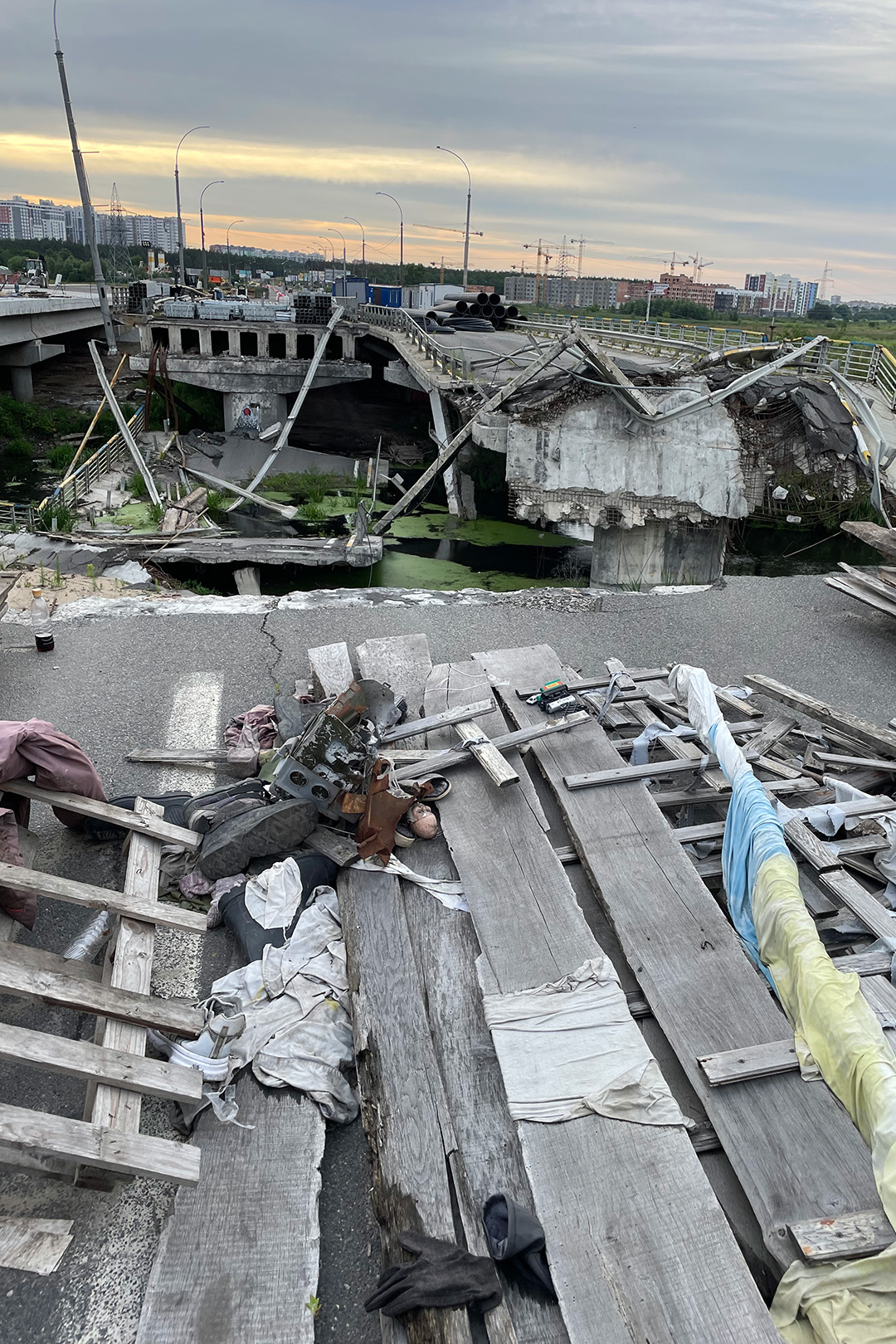In the early weeks of Russia’s invasion of Ukraine, Professor of Clinical Psychology Oksana Yakushko spent sleepless nights speaking with her family in Kyiv. From her then-home in California, Yakushko watched bombs fall on TV—and heard them echo over the telephone.
As her mother hid in a basement, “we talked day and night and the explosions sounded closer and closer,” Yakushko recalled. “Many times we said goodbye to each other. We never knew if it was the last time we would talk.”
This semester, as Yakushko begins her tenure as the new director of the Professional Psychology Program at the Columbian College of Arts and Sciences (CCAS), her mother is relatively safe in Kyiv and her sister’s family have escaped across the borders to Western Europe.
But as a licensed clinical psychologist and certified psychoanalyst who specializes in the traumas of the immigrant experience, Yakushko knows that mental health scars can be as devastating as war wounds.
She’s counseled refugees, asylum seekers and immigrants wrestling with questions of identity and culture. She’s lent her support to fellow clinicians—many of whom are immigrants themselves—guiding their clients through life-altering transitions.
And in her own immigrant story—from her childhood in Soviet-occupied Ukraine to her journey to the U.S. in the ’90s on a college scholarship— she’s encountered prejudices and stereotypes while forging a career as a leading thinker on the psychological stigma of xenophobia.
“These are difficult times throughout the world but we have to show up for those who are suffering,” she said. “Like any helping profession, what we do [in psychology] is hard work. But it’s a privilege to do it.”
It’s that same spirit of impactful, hands-on psychology that attracted Yakushko to the CCAS Professional Psychology Program. With its mix of foundational coursework and real-world experience—including its nonprofit Center Clinic where students see clients and hone their diagnostic and treatment skills—Yakushko called it a “unicorn program” for training future clinicians and responding to the mental health needs of communities in crisis.
She noted the unique way the program uses psychoanalytic and psychodynamic approaches, notably Freud’s work begun in Europe under conditions of wars and cultural struggles. She hopes her own track record of employing a psychodynamic focus to advance immigration and global-multicultural psychology will enhance the program’s mission.
“This is a very unique and distinct training space in psychology,” she said. “It’s an honor to be involved with these passionate students and faculty members. My goal is to find ways to support them and to keep their work growing.”
Transitions and Transformations
A renowned scholar, consultant and educator, Yakushko’s academic interests have included the history of psychology, contemporary psychoanalysis, intergenerational dynamics and trauma. While earning her PhD at the University of Missouri-Columbia, she was drawn to psychological issues surrounding immigration.
At the time, few experts were connecting xenophobia and mental health. But as she worked with NGOs, international foundations and aid groups, she saw the signs of trauma in immigrants from around the world.
Some were part of the “brain drain” of educated immigrants, she said, who left their home countries for employment opportunities. Others had endured profound suffering—torture survivors, trafficked people and war refugees. While each person’s immigrant journey was unique, Yakushko found psycho-social parallels in their experiences—and her own.
“Whether I am working with immigrants who come here for high-level positions or those who are escaping poverty and war, I have seen them face versions of, to put it mildly, not being welcome,” she said.
“They have struggles around how they are perceived and how they adapt. They have significant personal challenges to their identity, their relationships and their cultural selves. They are overloaded with transitions and transformations.”



During a 2023 mission to Irpin, Ukraine, Yakushko documented damage from the Russian siege that killed at least 300 civilians, destroyed university buildings, collapsed a bridge and left scores of cars bullet-riddled.
Yakushko said she’s experienced similar prejudices—although she stresses that being white and having access to education has given her advantages over other immigrants. Even as she’s held distinguished academic positions—including as a faculty member and administrative leader at several American academic institutions—she’s faced stereotypes.
Although she has lived in the U.S. for over 30 years, “to some extent, I am still perceived as a perpetual foreigner,” she said.
Real World Impacts
Since the Russian invasion, Yakushko has focused much of her attention on supporting Ukraine aid efforts. She’s collaborated with groups like the National Psychological Association of Ukraine, UN-based NGOs, USAID projects and international humanitarian and mental health professional organizations. She attended a recent Warsaw conference on war violence against women and girls. And she is compiling videos and essays from psychoanalysts working on the frontlines for a forthcoming book, Psychology under Conditions of War in Ukraine (Routledge).
Meanwhile, Yakushko has returned to Kyiv to support her mother and colleagues. During several trips, she found her old neighborhoods devastated. On many occasions, she huddled in bomb shelters as aid raid sirens rang through the city. “We are seeing Ukrainians being targeted for being Ukrainian. They are being told they should not exist as a people,” she said. “No group, no immigrant, no human being should ever have to face that.”
Like her colleagues abroad, Yakushko said students and faculty at the CCAS Professional Psychology Program are making real-world impacts each day. She pointed to their work addressing racial traumas and mental health challenges within the LGBTQ community and serving diverse populations at the Center Clinic, at many local community mental health sites and across the U.S. through pre-doctoral internships. As director, Yakushko believes her expertise and experience complement the program’s “practitioner-scholar” model—advancing the science of psychology while making a difference in people’s lives.
“I have been involved in training students and professional psychologists in today’s world to think about how to work with individuals and communities,” she said. “And that’s what we have been doing here—and what we are committed to doing as we move forward.”


